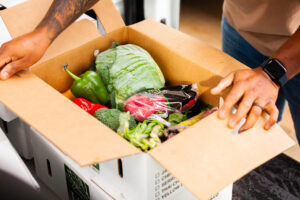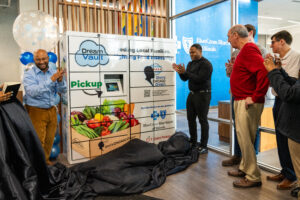Metropolitan cities are experiencing instances of food insecurity at an alarming rate, and Black communities are being hit the hardest. In 2022, Feeding America reported that “1 in 5 Black people” or “nearly 23% of Black people in the United States experienced food insecurity.” This finding was almost “two-and-a-half times the rate of white people.”
Feeding America also shared the USDA’s statistics on Black communities’ limited access to healthier food options. The organization reported that “nearly 9 million Black people” have experienced the inability to access healthy food, thus leading to a less healthy lifestyle.
While some programs such as SNAP and Food and Nutritional Services (aka food stamps) exist, due to government budget cuts and instances of racist and discriminatory requirements, these programs aren’t always the answer for some. Couple these disparities with the constant boost in food costs, and access to healthy food options becomes increasingly challenging for some. Some residents in these areas have taken it upon themselves to serve their community by providing healthy food options.
In Chicago, Dion Dawson is combating food insecurity door-to-door from the trunk of his car. He began handing out food from his car to locals in need in 2019. Two years later, Dawson launched Dion’s Chicago Dream with Project Dream Fridge, a community fridge in Englewood, an underserved community in the southside of Chicago. Every week, Dion’s Chicago Dream delivers fresh, quality products to the doorsteps of over 1,000 households across 33 Chicago neighborhoods, totaling 43,000 pounds of food each month.
As a child growing up in Englewood, Dawson experienced homelessness and hunger. After serving in the Navy, he returned home and saw his neighborhood was suffering from the same issues. With the launch of Dion’s Chicago Dream, Dawson focused on innovation, improving food philanthropy and transforming how we address food insecurity in this country.
On Feb. 1, the organization will reach a major milestone when it makes a special delivery to a family in the area. This drop-off will indicate the delivery of one million pounds of fruits and vegetables to recipients since 2021. That’s equivalent to over 340,000 family servings. Blavity spoke with Dawson about his non-profit working to address food access and equality in his own backyard.
Blavity: What inspired you to start Dion’s Chicago Dream?
Dion Dawson: As a kid growing up on Chicago’s South Side — and again as a Navy veteran — I’ve experienced first-hand what it’s like not to know where your next meal is coming from. I’m not alone: In our city, 1 in 5 households are at risk of food insecurity. They don’t have regular access to enough nutritious food for average growth and development and an active and healthy life.
During the pandemic, we all saw the obvious need for people to have a dependable supply of nutritious food. Traditional food charities like food pantries and soup kitchens ramped up but still weren’t meeting those needs. And then, when I looked around at existing food charities, I didn’t see many fellow Black people in top leadership.
Dion’s Chicago Dream was born out of my hope that we could find innovative new ways to ensure people could count on getting healthy food on a regular schedule. We started Dream Fridge, a community pantry where we stocked fresh food daily. Then, we started the program we’re best known for: Dream Deliveries. We buy top-quality fresh fruits and vegetables, pack them into 10-pound boxes and deliver them weekly to more than 1,200 households across Chicagoland. And now we’re rolling out our latest innovation: Dream Vaults. Picture Amazon lockers, but for fresh fruits and vegetables. Dream Vaults are network-enabled banks of lockers that our recipients can unlock with a code. Each Dream Vault can serve up to 175 households a week, and we put them inside a store or other gathering spot for a neighborhood.
All of our recipients know that we deliver what and when we promise. We work hard to keep their trust.
Blavity: Food insecurity is a significant issue within this country, especially within Black communities. As someone working to remove that in their community, what do you think is the root of the problem?
DD: On one hand, food insecurity can look like a straightforward technical and logistical problem: We haven’t bothered to develop a way to identify who is food secure, let alone a way to make sure everyone has access to the healthy food they need to thrive, all the time.
On the other hand, food insecurity is tangled up with all the other problems afflicting our society, including systemic racism, economic inequality, political tribalism and corporate profits that too often come at the cost of people’s health.
I believe consistent access to healthy food is a human right. That may be the way to address all the underlying issues at once. If our country recognized a ready supply of nutritious food as a human right and tried to ensure that right for every person, that would be a game-changer.

Blvaity: How has the city of Chicago supported you in your endeavors to help the community?
DD: Their support has been vital for our growth and has played a huge part in getting the word out about Dion’s Chicago Dream through social media and word of mouth.
We’ve also had great support from beloved local institutions, including the Chicago Bulls of the NBA, the Blackhawks of the NHL, the Chicago Sky of the WNBA and the Obama Foundation. Local media has amplified our story, which we appreciate, and we’re building on that coverage to reach national audiences.
As for the official City of Chicago — as in our city government — it doesn’t support us financially — at least not yet. But we’re on the city’s radar screen and thrilled that Mayor Brandon Johnson is scheduled to participate in our Dream Day celebration on Feb. 1.
Blavity: “Dream Day” celebrates your organization reaching the milestone of delivering one million pounds of food within its three-and-a-half years. What will the day entail to commemorate that special delivery?
DD: We’re kicking off Dream Day by gathering our Dream Team employees and partners to reflect on what this achievement means for our recipients, the city, and ourselves personally. I will share the encouraging results of a participant survey commissioned by the American Diabetes Association, which confirms that our model is working: Our Dream Delivery recipients report eating better and improving health markers such as blood pressure, energy levels, blood sugar levels and overall well-being.
Then, we’re meeting up with political and community leaders to make our 1-million-pound milestone delivery, along with some other special deliveries, and that’s when the fun kicks into high gear. It’s all a surprise for the recipients, so I can’t share the details yet – I don’t want to ruin the surprise.
Blavity: Dion’s Chicago Dream introduced “Dream Vaults” in 2023. Please provide details on what they are and how you hope they will impact your mission.
DD: Dream Vaults are a great way to deliver fresh fruits and vegetables to several households at once while bringing foot traffic into local grocery stores and other community hubs and helping them stay in the community. These network-enabled lockers allow each family to enter their code and pick up their weekly delivery.
Each Dream Vault can serve up to 175 households each week. We place them in grocery stores or other neighborhood hubs, and when our recipients come in to pick up their fresh fruits and vegetables, they also tend to stick around to shop. All this helps keep money circulating within the community.
Our plans are ultimately to scale outside Chicago, well into connecting states and nationally. Dream Vaults are great for our recipients and their neighborhoods.

Blavity: Does DCD support local farmers/grocers when sourcing the food for deliveries?
DD: Our source for fresh fruits and vegetables is a local company named JAB Produce, which has been our partner since the very first delivery. Our one-million-pound milestone would not be possible without them. JAB has done a great job ensuring a consistent and varied supply of top-quality produce.
As we continue to grow and scale, we’re also exploring ways to access local farmers and growers. We’re working on the logistics, including a partner portal that will facilitate buying fresh fruits and vegetables from producers in our region.
Blavity: How does it feel to know you and your organization have helped so many people, and how do you plan to top this milestone?
DD: It feels amazing! But we’re also extremely grateful. When it comes to being a community leader or a social impact organization, we would be nothing without the people we serve. They have to be willing to trust us, let us understand what they need, and accept what we’re offering. We think we have a great model for tackling food insecurity, but it only works if it’s accepted by the people who support non-profits and those who need our services.
We can only top this milestone by hiring more people, providing more produce and spreading this model as far as possible. We want to share what we’ve learned and empower and equip local leaders nationwide to tackle food insecurity in their communities.
There are a whole lot more Dions out there! And I can imagine the day when Dion’s Chicago Dream is joined by Jessica’s New York Dream and Juan’s Los Angeles Dream, with community leaders doing great things all across the country.
Blavity: While you are already doing the work, what do you think the true meaning of community service is?
DD: The true meaning of community service is a marriage of stewardship and communication. It’s about having honest conversations to understand the community’s needs and then doing whatever you can to meet them, given your level and resources.
Everything has to be centered on the people you serve. I think that’s the reason for our rapid growth and community acceptance. We started with a recipient view of the problem and possible solutions, and we continue to talk to our recipients by phone every other week, getting feedback and ensuring we keep serving them as they want to be served.
Learn more about Dion’s Chicago Dream below!
